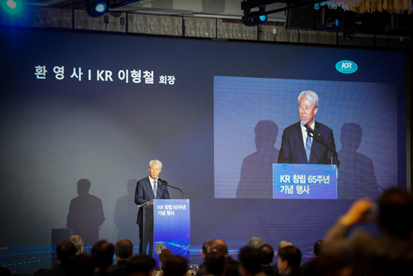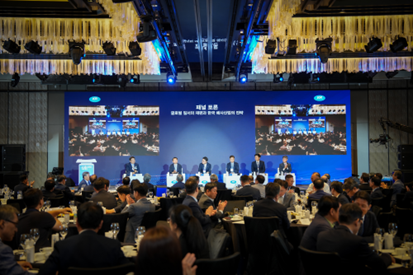-
- KR Marks 65th Anniversary with Industry Forum Calling for a Korean Maritime Cluster
- KR Expands Technical Collaboration at Nor-Shipping 2025
- KR Releases 10th Issue of KR Decarbonization Magazine
- KR and HD Hyundai Samho Join Forces to Bring AI into Ship Design
- KR Teams Up with Leading Shipbuilders and KTR to Develop International Standards for Ammonia Effluent Discharge
- KR-Team Korea Holds First Wing Sail Demonstration to Advance Green Shipping
- KR and HD Hyundai Pioneer BOG Reuse System for LNG-Fueled Vessel at Berth
- KR Grants AIP to HD HHI for Innovative CHS of Membrane Ammonia Tank
- KR Chairs 54th TSCF Meeting Reinforcing Global Collaboration on Tanker Safety
-
- MEPC 83 - News Final
- MSC110 - News Flash
- Revision of " Guidelines for Ships carrying Liquefied Hydrogen in Bulk"
- Establishment of the “Guidelines for Approval of Metallic Materials in Hydrogen Service”
- [2025-IMO-08] FAQ on IMO GHG Reduction Measures
- Notification of LNG Bunkering Guidelines Issued by Directorate General of Shipping, India
- KR Marks 65th Anniversary with Industry Forum Calling for a Korean Maritime Cluster
- KR Expands Technical Collaboration at Nor-Shipping 2025
- KR Releases 10th Issue of KR Decarbonization Magazine
- KR and HD Hyundai Samho Join Forces to Bring AI into Ship Design
- KR Teams Up with Leading Shipbuilders and KTR to Develop International Standards for Ammonia Effluent Discharge
- KR-Team Korea Holds First Wing Sail Demonstration to Advance Green Shipping
- KR and HD Hyundai Pioneer BOG Reuse System for LNG-Fueled Vessel at Berth
- KR Grants AIP to HD HHI for Innovative CHS of Membrane Ammonia Tank
- KR Chairs 54th TSCF Meeting Reinforcing Global Collaboration on Tanker Safety
- MEPC 83 - News Final
- MSC110 - News Flash
- Revision of " Guidelines for Ships carrying Liquefied Hydrogen in Bulk"
- Establishment of the “Guidelines for Approval of Metallic Materials in Hydrogen Service”
- [2025-IMO-08] FAQ on IMO GHG Reduction Measures
- Notification of LNG Bunkering Guidelines Issued by Directorate General of Shipping, India
-
- KR Marks 65th Anniversary with Industry Forum Calling for a Korean Maritime Cluster
- KR Expands Technical Collaboration at Nor-Shipping 2025
- KR Releases 10th Issue of KR Decarbonization Magazine
- KR and HD Hyundai Samho Join Forces to Bring AI into Ship Design
- KR Teams Up with Leading Shipbuilders and KTR to Develop International Standards for Ammonia Effluent Discharge
- KR-Team Korea Holds First Wing Sail Demonstration to Advance Green Shipping
- KR and HD Hyundai Pioneer BOG Reuse System for LNG-Fueled Vessel at Berth
- KR Grants AIP to HD HHI for Innovative CHS of Membrane Ammonia Tank
- KR Chairs 54th TSCF Meeting Reinforcing Global Collaboration on Tanker Safety
-
- MEPC 83 - News Final
- MSC110 - News Flash
- Revision of " Guidelines for Ships carrying Liquefied Hydrogen in Bulk"
- Establishment of the “Guidelines for Approval of Metallic Materials in Hydrogen Service”
- [2025-IMO-08] FAQ on IMO GHG Reduction Measures
- Notification of LNG Bunkering Guidelines Issued by Directorate General of Shipping, India
Korean Register (KR) celebrated its 65th anniversary on June 11 with a high-level technical seminar at the Four Seasons Hotel in Seoul, bringing together more than 280 participants from the government, shipbuilding, shipping, and marine equipment sectors. The event served as a platform for industry stakeholders to explore the strategic direction of Korea’s maritime competitiveness amid shifting global dynamics. The seminar featured a panel discussion that addressed structural threats facing Korea’s shipbuilding and shipping sectors, and the growing need for coordinated policy responses. A recurring theme across the discussion was the urgent call for establishing a Korean-style maritime cluster to secure long-term industrial competitiveness.
|


